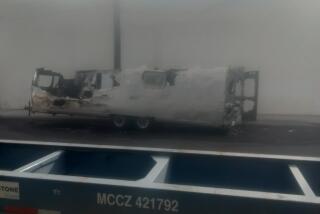Thieves Get Her ‘Life’s Work’ : Films, Artworks of Bhutan Taken From Car Trunk
- Share via
A professor who spent a decade trekking through south Asia, studying the tiny kingdom of Bhutan and the villages of Nepal, lost her life’s work when thieves broke into a car trunk in Seal Beach, stealing her films, slides, tapes and artworks.
“When I started my travels in that part of the world in ‘67, it was the last outpost of an ancient culture that was dying out,” Gabrielle said Friday. She asked that her last name not be used because she fears the thieves. “When I finished my work 10 years later, the culture was pretty much gone. But I thought that with my film and the notes I was going to turn into a book, the art and civilization of these people would live on.”
But now, said Gabrielle, a former teacher at Cal State Long Beach, that art and culture may be lost forever. On Wednesday, thieves broke into the trunk of a friend’s car, taking all her research and valuable rings and earrings.
Ironically, her friend had taken the things to his home on Surf Place in Seal Beach for safekeeping. Gabrielle, 48, who has sublet her Long Beach apartment, will leave next week to work as a visiting professor at East Carolina University in North Carolina.
The Seal Beach police said they haven’t recovered the items.
“I’m going a little crazy,” Gabrielle said. “I made my life’s work the art and culture of the kingdom of Bhutan.”
Bhutan is in the Himalayas, lodged between India and Tibet. About 750,000 people live in its 18,000 square miles. In 1967-76, the New Jersey native spent all her time in that part of the world while researching its art and people. She endured the brutal winters of the Himalayas and the torrid summers of the jungles of India.
The modern world was encroaching on the tiny kingdom of Bhutan, the villages of Nepal and the hamlets on north India, she said, threatening the arts and crafts of their ancient civilizations.
As an artist, anthropologist and film maker, Gabrielle was able to capture on film, in photographs and in interviews, how aging men and women made intricate jewelry and painted the way their ancestors had done for a thousand years.
“Whether it was rugs, paintings or statutes,” Gabrielle said, “I was interested in it all. I was like a detective trying to work out the meaning of the designs. They were like clues to the cultural map of Bhutan and to the religious beliefs of the people.”
She said she was allowed privileged access to the collection of the late king of Bhutan.
She had artisans make exact replicas of ancient artifacts in his collection and others, along with jewelry in traditional designs. “It was all ornately carved the way artisans in Bhutan had been doing it for hundreds of years. Today, it could not be reproduced because the last artisans who worked in this style are dead.”
Gabrielle said scholars thought her research work was important enough that she was able to get foundation grants to pay for her 10-year stay in the country and surrounding region.
Last Wednesday, a friend of Gabrielle’s loaded much of her research and artwork into his trunk. The friend, a math
professor at Cal State Fullerton who also asked that his name not be used because he fears the burglars, said that as he pulled into his driveway, he heard his phone ringing. After locking the car door, he ran inside to answer the phone.
Because of the long phone conversation and other distractions in his house, the professor said Friday, he did not return to the car for 2 1/2 hours.
The trunk of his 1974 Toyota Corolla had been pried open. Gabrielle’s possessions were gone.
The friend said he is heartsick. “I talked with the neighbors, and they saw nothing unusual happening. A neighbor’s bike was stolen three weeks ago. But I’ve lived here since ‘71, and I haven’t had any problems. This isn’t a high crime area.”
Gabrielle said she is offering “a substantial reward” for the return of her belongings. She will not say how much the art and jewelry are worth, except to say that they are not insured but are “artistically priceless.”
“I walked across Bhutan for 10 years, living in cornfields and trees. I risked my life to get these materials,” she said.
“I want them back, and not for myself. I don’t want the knowledge of Bhutan lost forever.”
More to Read
Sign up for Essential California
The most important California stories and recommendations in your inbox every morning.
You may occasionally receive promotional content from the Los Angeles Times.













